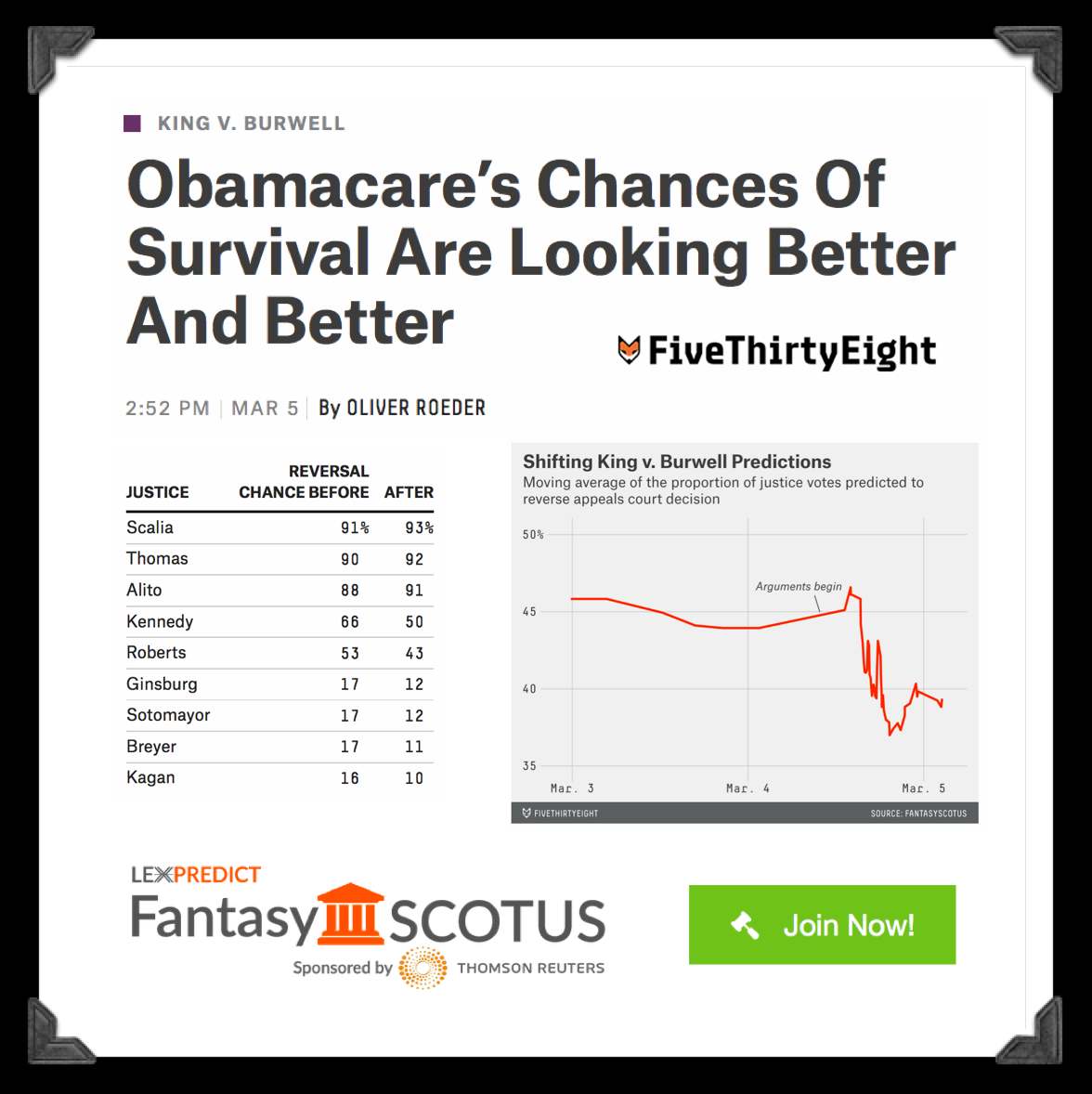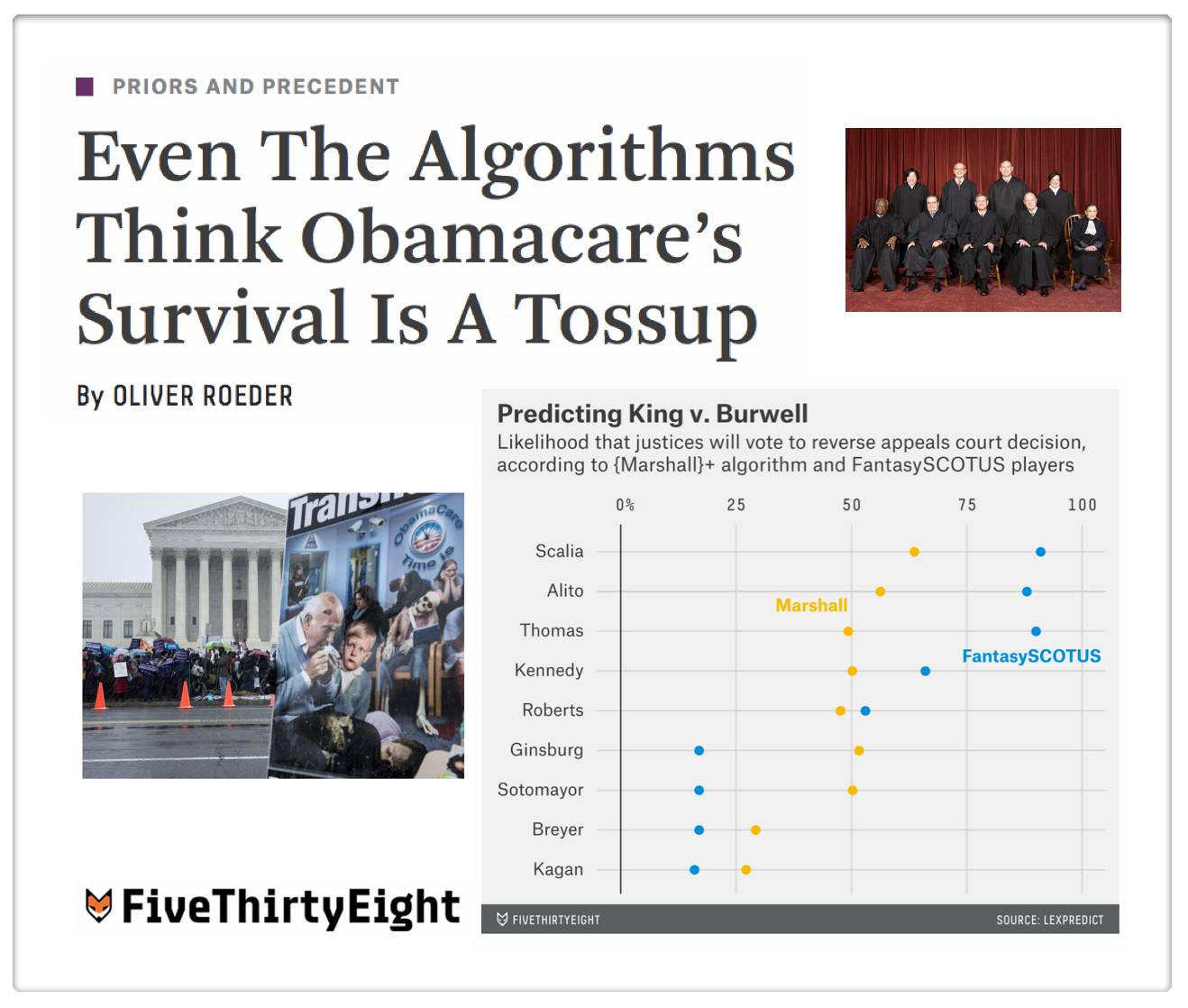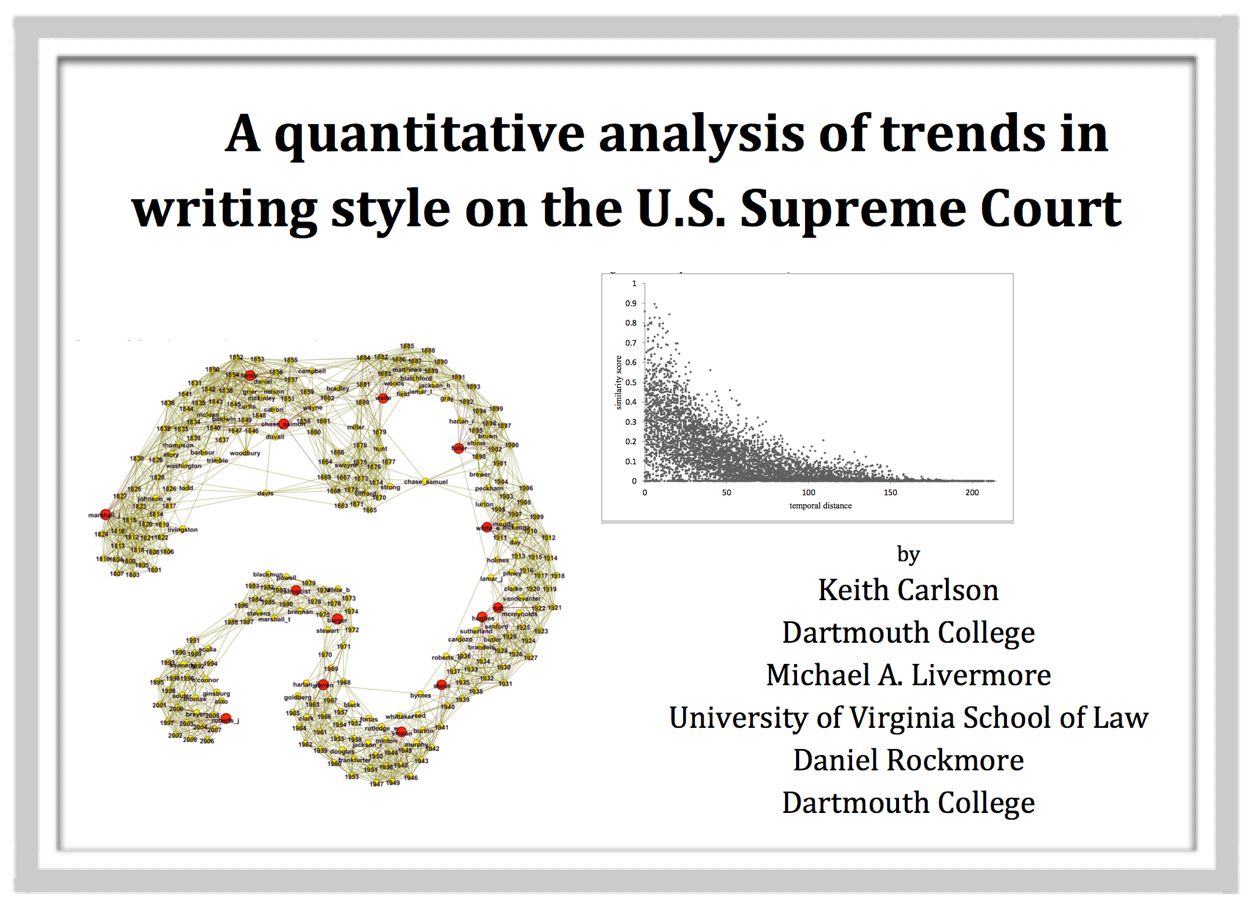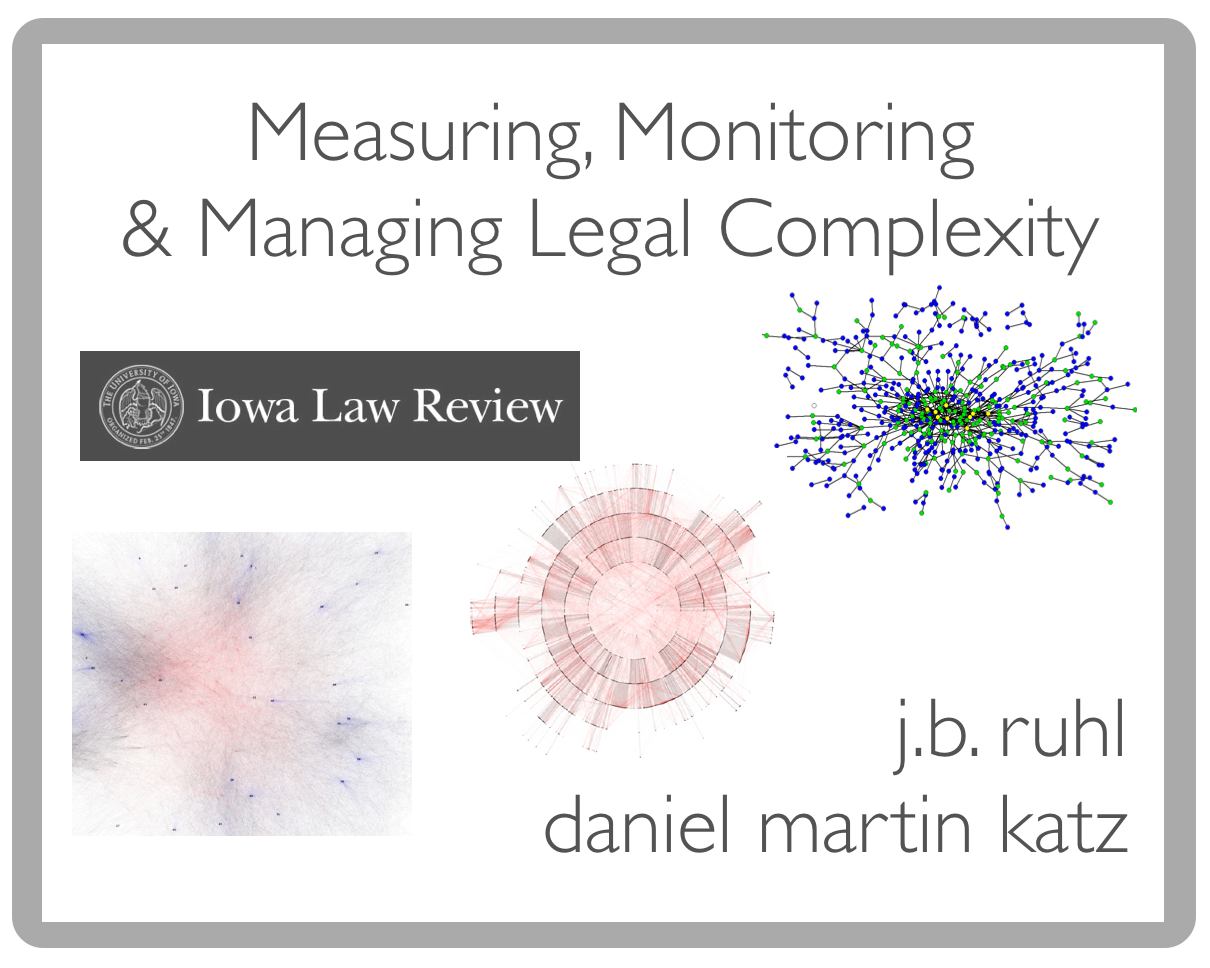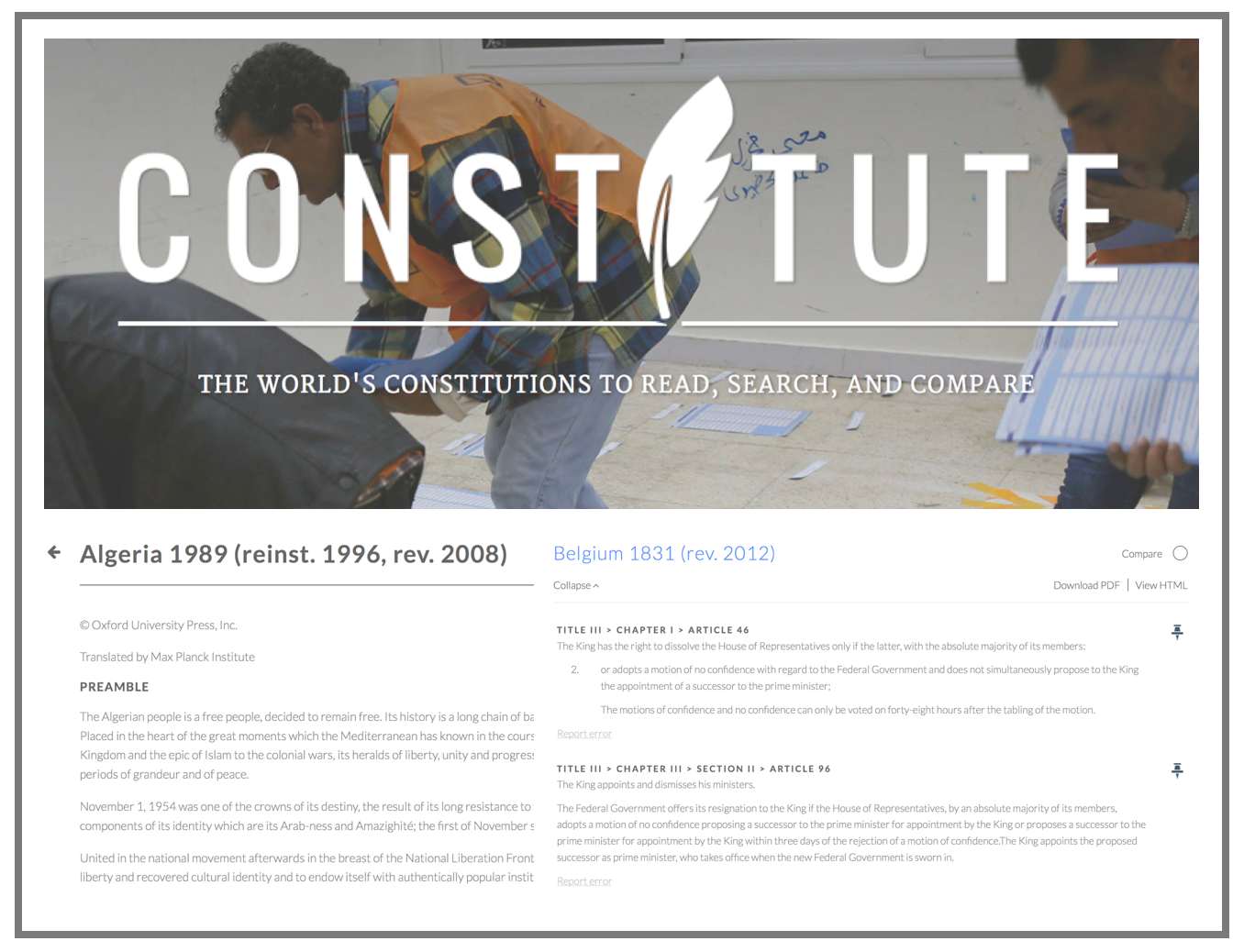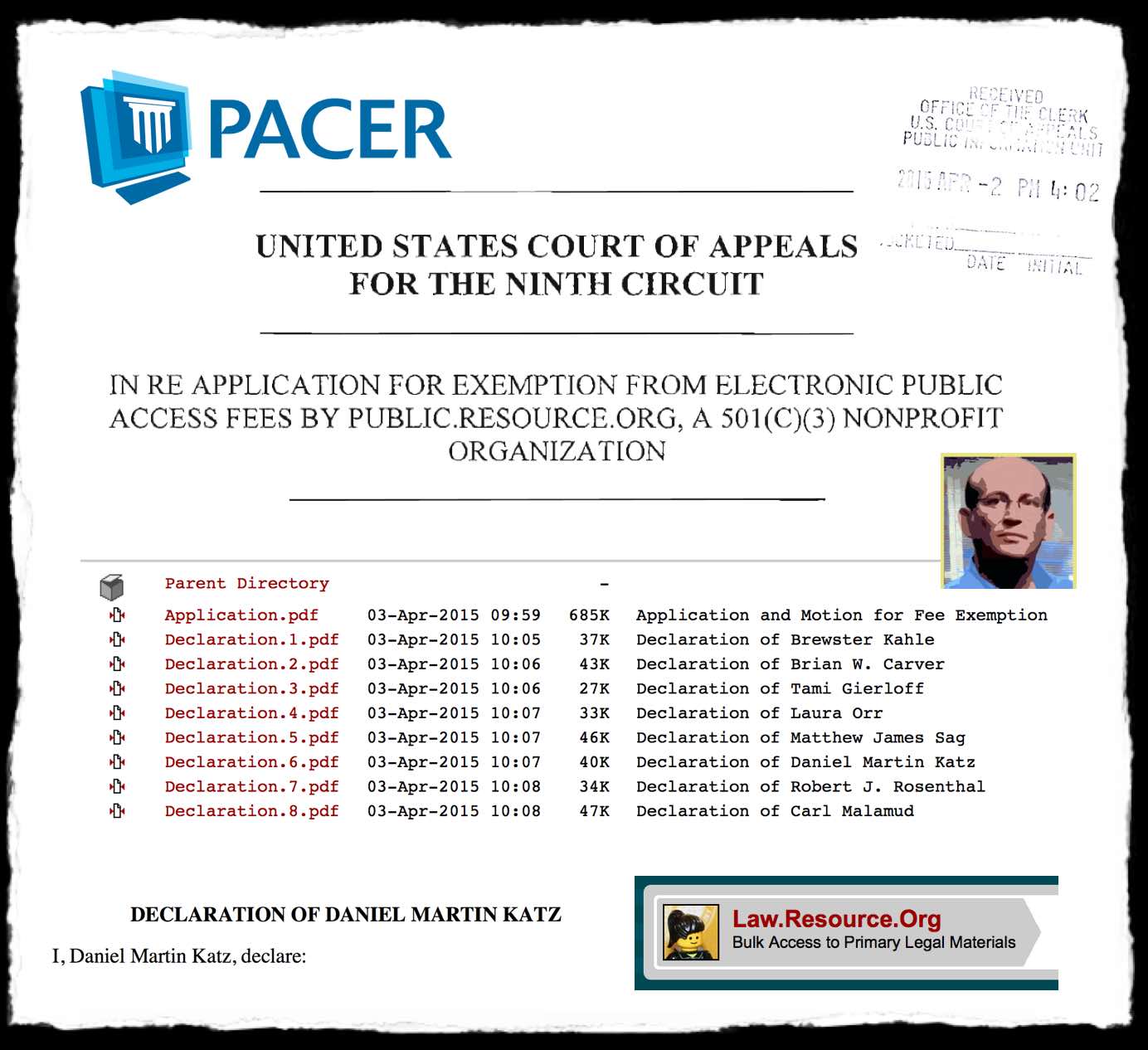 I signed a declaration — Read more about it here!
I signed a declaration — Read more about it here!
Tag: computational legal studies
Chicago Legal Innovation & Technology Meetup (@Skadden in Chicago)
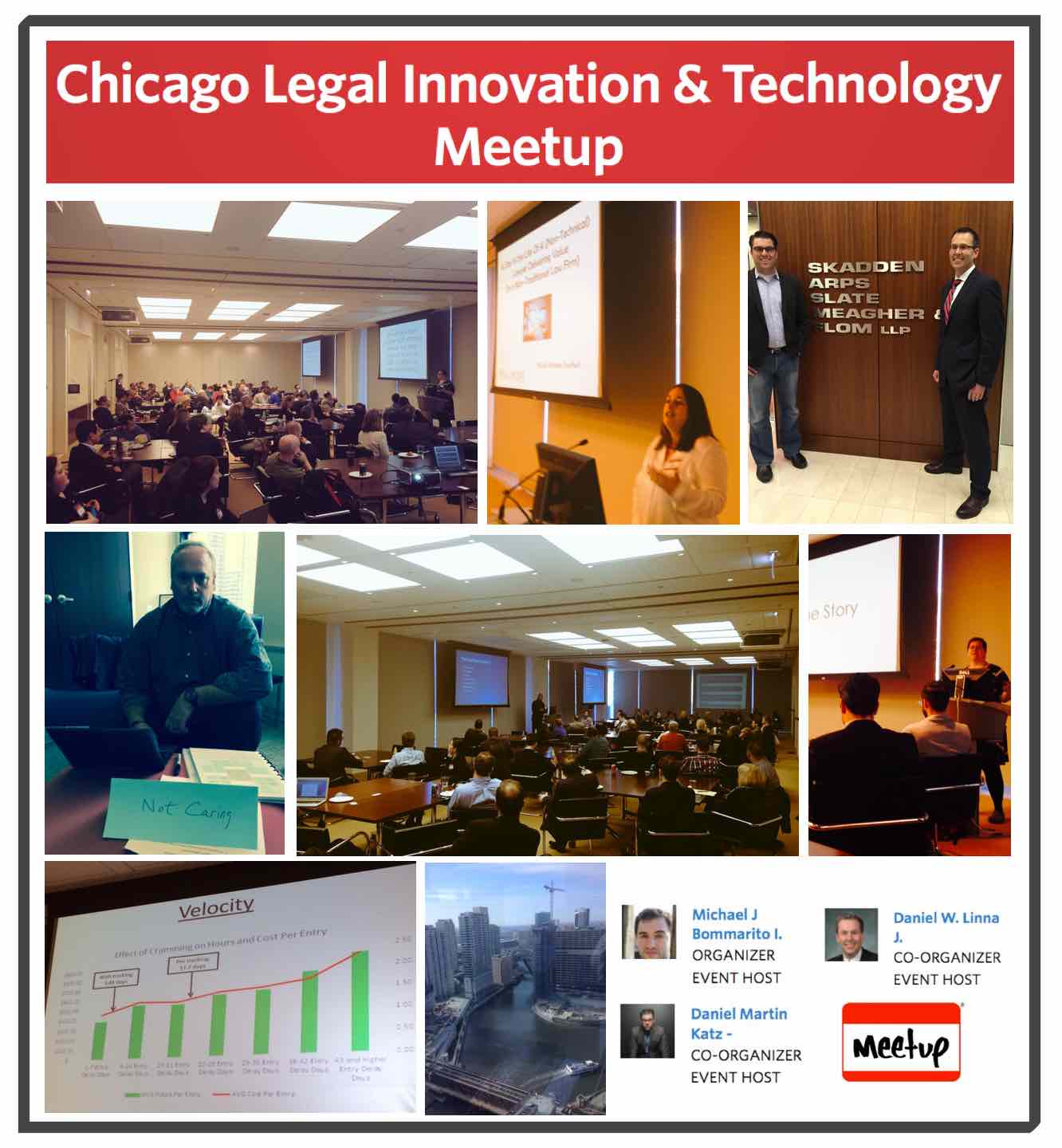 Thanks to everyone who joined us last night @Skadden for the Chicago Legal Innovation & Technology Meetup. Our next meeting is at Chapman & Cutler in May with a series of additional events in the months to come …
Thanks to everyone who joined us last night @Skadden for the Chicago Legal Innovation & Technology Meetup. Our next meeting is at Chapman & Cutler in May with a series of additional events in the months to come …
Even The Algorithms Think Obamacare’s Survival Is A Tossup (via 538.com)
Readers will probably observe that {Marshall+} is still a work in progress (for example – my colleague noted {Marshall+} believes that Justice Ginsburg would appear to be slightly more likely to vote to overturn the ACA than Justice Thomas). While this probably will not prove to be correct in King v. Burwell, our method is rigorously backtested and designed to minimize errors across all predictions (not just in this specific case). This optimization question is tricky for the model and it will be the source of future model improvements. I have preached the whole mantra Humans + Machines > Humans or Machines and this problem is a good example. The problem with exclusive reliance upon human experts is they have cognitive biases, info processing issues, etc. The problem with models is that they generate errors that humans would not.
Anyway, the good thing about having a base model such as {Marshall+} is that we can begin to incorporate a range of additional information in an effort to create a {Marshall++} and beyond. And on that front there is more to come …
Daniel Martin Katz to Join IIT Chicago-Kent Faculty to Support Chicago Kent’s Ongoing Initiative to Build the Preeminent Law & Technology Program in the Country
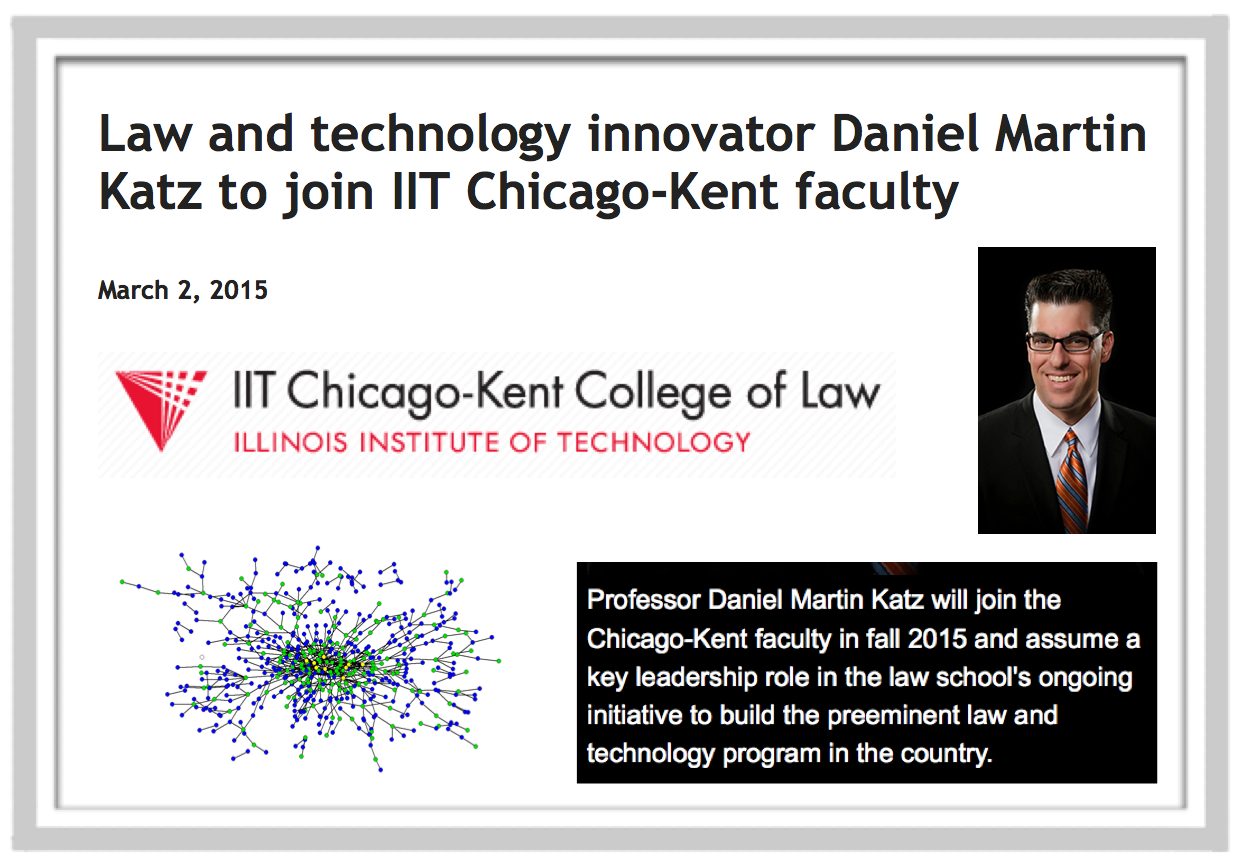 I am excited to announce that I am leaving MSU to join the Chicago-Kent College of Law where I have accepted a lateral offer starting this summer.
I am excited to announce that I am leaving MSU to join the Chicago-Kent College of Law where I have accepted a lateral offer starting this summer.
It is has been a good run here at MSU Law and wish my MSU colleagues all the best.
The opportunity to be part of one of the long standing and premier law+tech programs is extremely exciting and I look forward to doing great things with my new colleagues at Chicago Kent. As noted in the press release, I am excited to “assume a key leadership role in the law school’s ongoing initiative to build the preeminent law and technology program in the country!”
More to come starting this summer …
LegalAnalyticsCourse.com — Now Online (but still in beta)
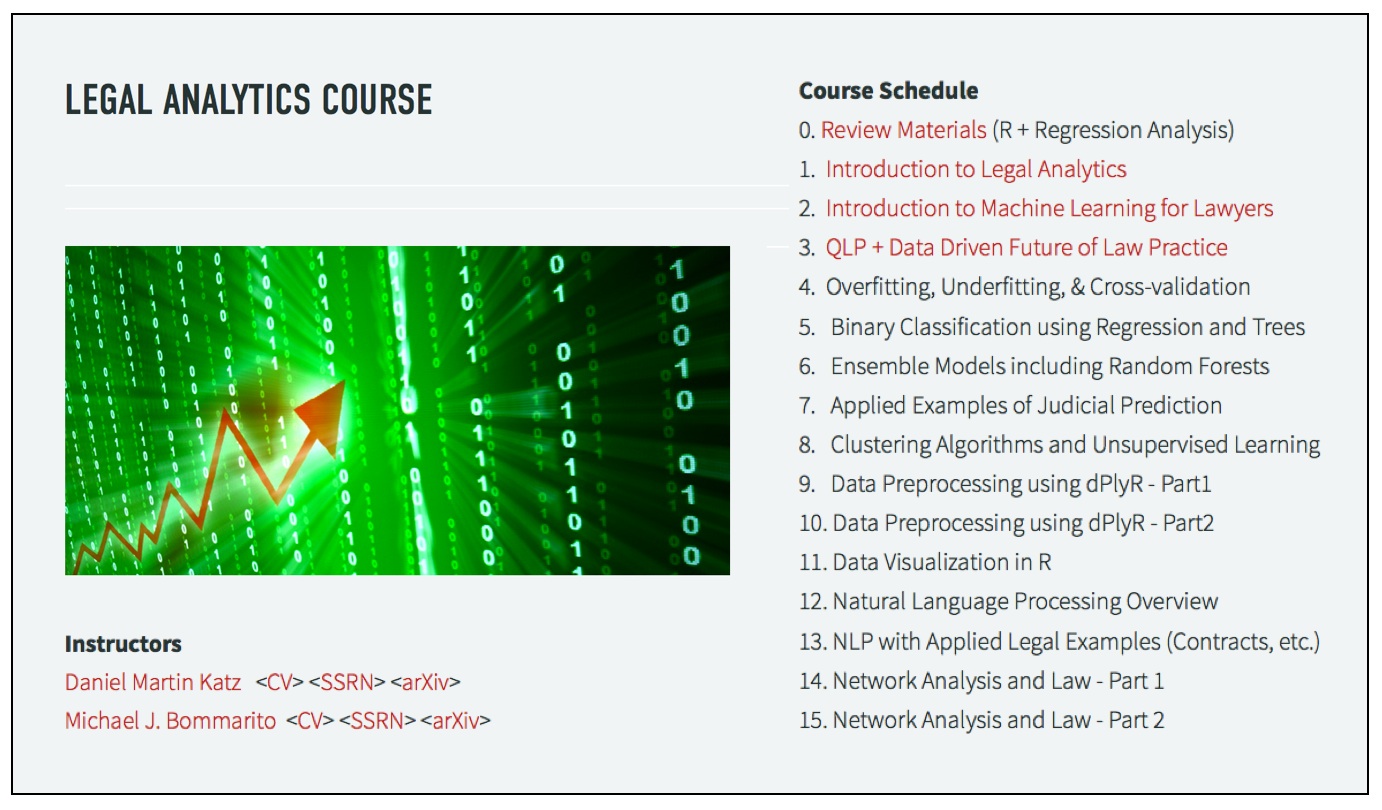 This intro class is designed to train students to efficiently manage, collect, explore, analyze, and communicate in a legal profession that is increasingly being driven by data.
This intro class is designed to train students to efficiently manage, collect, explore, analyze, and communicate in a legal profession that is increasingly being driven by data.
Our goal is to imbue our students with the capability to understand the process of extracting actionable knowledge from data, to distinguish themselves in legal proceedings involving data or analysis, and assist in firm and in-house management, including billing, case forecasting, process improvement, resource management, and financial operations.
This course assumes prior knowledge of statistics, such as might be obtained in Quantitative Methods for Lawyers or through advanced undergraduate curricula. This class is not for everyone; for many, it will prove to be challenging. With that warning, we encourage you to consider your interest and career aspirations against the unique experience and value of this class. To our knowledge, this is the only existing class that teaches these quantitative skills to lawyers and law students.
Still in beta – we will be adding much more to this site as we move forward!
Legal Analytics – Introduction to the Course – Professors Daniel Martin Katz + Michael J Bommarito
Here is an introductory slide deck from “Legal Analytics” which is a course that Mike Bommarito and I are teaching this semester. Relevant legal applications include predictive coding in e-discovery (i.e. classification), early case assessment and overall case prediction, pricing and staff forecasting, prediction of judicial behavior, etc.
As I have written in my recent article in Emory Law Journal – we are moving into an era of data driven law practice. This course is a direct response to demands from relevant industry stakeholders. For a large number of prediction tasks … humans + machines > humans or machines working alone.
We believe this is the first ever Machine Learning Course offered to law students and it our goal to help develop the first wave of human capital trained to thrive as this this new data driven era takes hold. Richard Susskind likes to highlight this famous quote from Wayne Gretzky … “A good hockey player plays where the puck is. A great hockey player plays where the puck is going to be.”
Legal by Design: A New Paradigm for Handling Complexity in Banking Regulation and Elsewhere in Law (Lippe, Katz & Jackson)
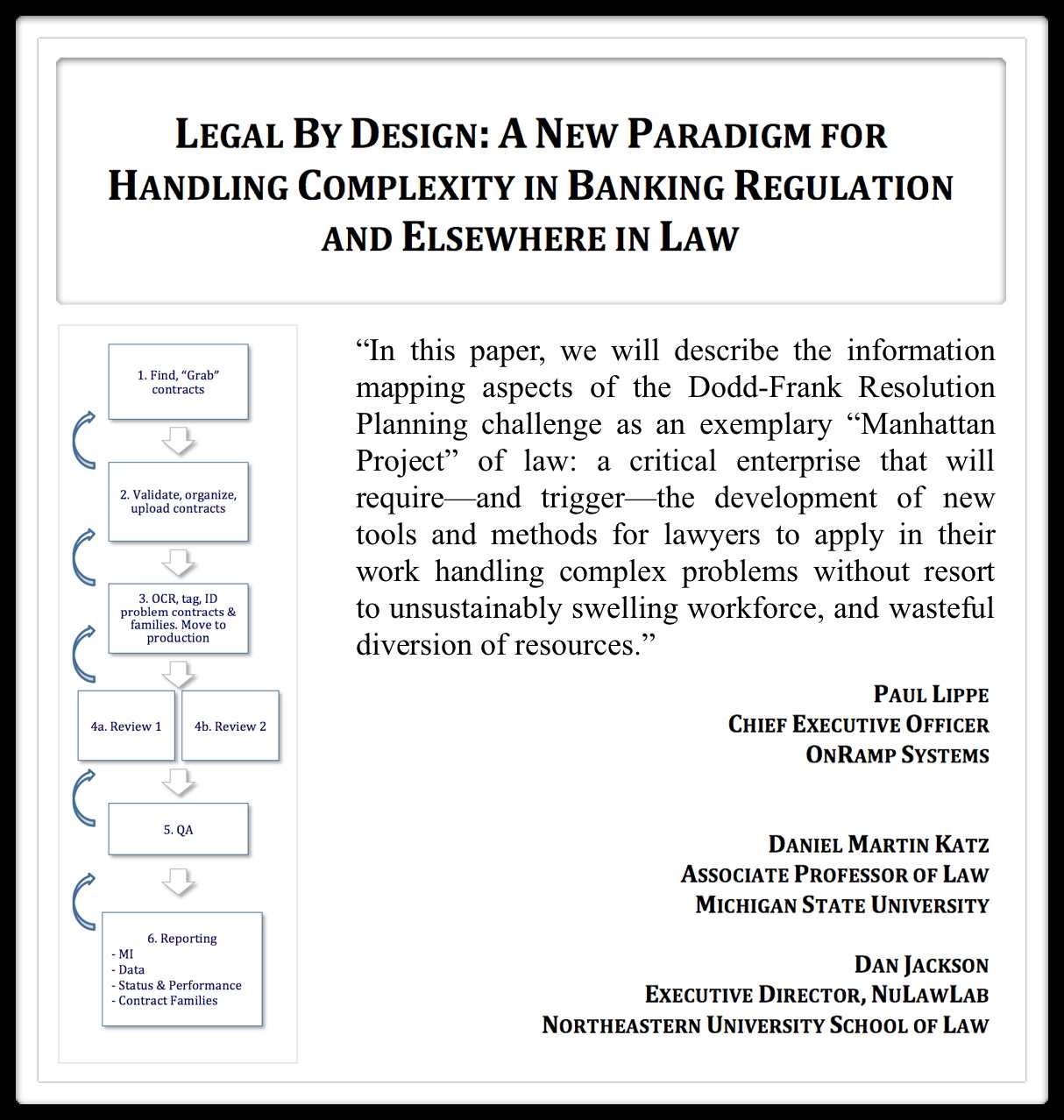 From SSRN abstract: “On August 5, 2014, the Federal Reserve Board and the Federal Deposit Insurance Corporation criticized shortcomings in the Resolution Plans of the first Systematically Important Financial Institution (SIFI) filers. In his public statement, FDIC Vice Chairman Thomas M. Hoenig said “each plan [submitted by the first 11 filers] is deficient and fails to convincingly demonstrate how, in failure, any one of these firms could overcome obstacles to entering bankruptcy without precipitating a financial crisis.”
From SSRN abstract: “On August 5, 2014, the Federal Reserve Board and the Federal Deposit Insurance Corporation criticized shortcomings in the Resolution Plans of the first Systematically Important Financial Institution (SIFI) filers. In his public statement, FDIC Vice Chairman Thomas M. Hoenig said “each plan [submitted by the first 11 filers] is deficient and fails to convincingly demonstrate how, in failure, any one of these firms could overcome obstacles to entering bankruptcy without precipitating a financial crisis.”
The first eleven SIFIs — Bank of America, Bank of New York Mellon, Barclays, Citigroup, Credit Suisse, Deutsche Bank, Goldman Sachs, JPMorgan Chase, Morgan Stanley, State Street Corp. and UBS — include some of the largest organizations in the world, with sophisticated internal and external teams of professional advisors. According to Jamie Dimon of JPMorgan Chase in 2013, it took 500 professionals over 1 million hours per year to produce JPMorgan Chase’s annual Resolution plan. With regulatory pressure increasing, that number is likely to be consistent or increasing across first-wave filers, and suggests significant spending by all filers.
So why were the plans criticized despite heavy compliance investment? The Fed and FDIC identified two common shortcomings across the first 11 SIFI filers: “(i) assumptions that the agencies regard as unrealistic or inadequately supported, such as assumptions about the likely behavior of customers, counterparties, investors, central clearing facilities, and regulators, and (ii) the failure to make, or even to identify, the kinds of changes in firm structure and practices that would be necessary to enhance the prospects for orderly resolution.” We believe this regulatory response highlights, in part, the need for lawyers (and other advisors) to develop approaches that can better manage complexity, encompassing modern notions of design, use of technology, and management of complex systems.
In this paper, we will describe the information mapping aspects of the Resolution Planning challenge as an exemplary “Manhattan Project” of law: a critical enterprise that will require — and trigger — the development of new tools and methods for lawyers to apply in their work handling complex problems without resort to unsustainably swelling workforce, and wasteful diversion of resources. Fortunately, much of this approach has already been developed in innovative Silicon Valley legal departments and has been applied by leading banks. Although much of the focus of the Dodd-Frank Act is on re-organizing and simplifying banks, we will focus here on the information architecture issues which underlie much of what should — and will — change about how law is delivered, not just for Resolution Planning, but more broadly.”
Using R for Quantitative Methods for Lawyers and Legal Analytics Courses (Professors Katz + Bommarito)
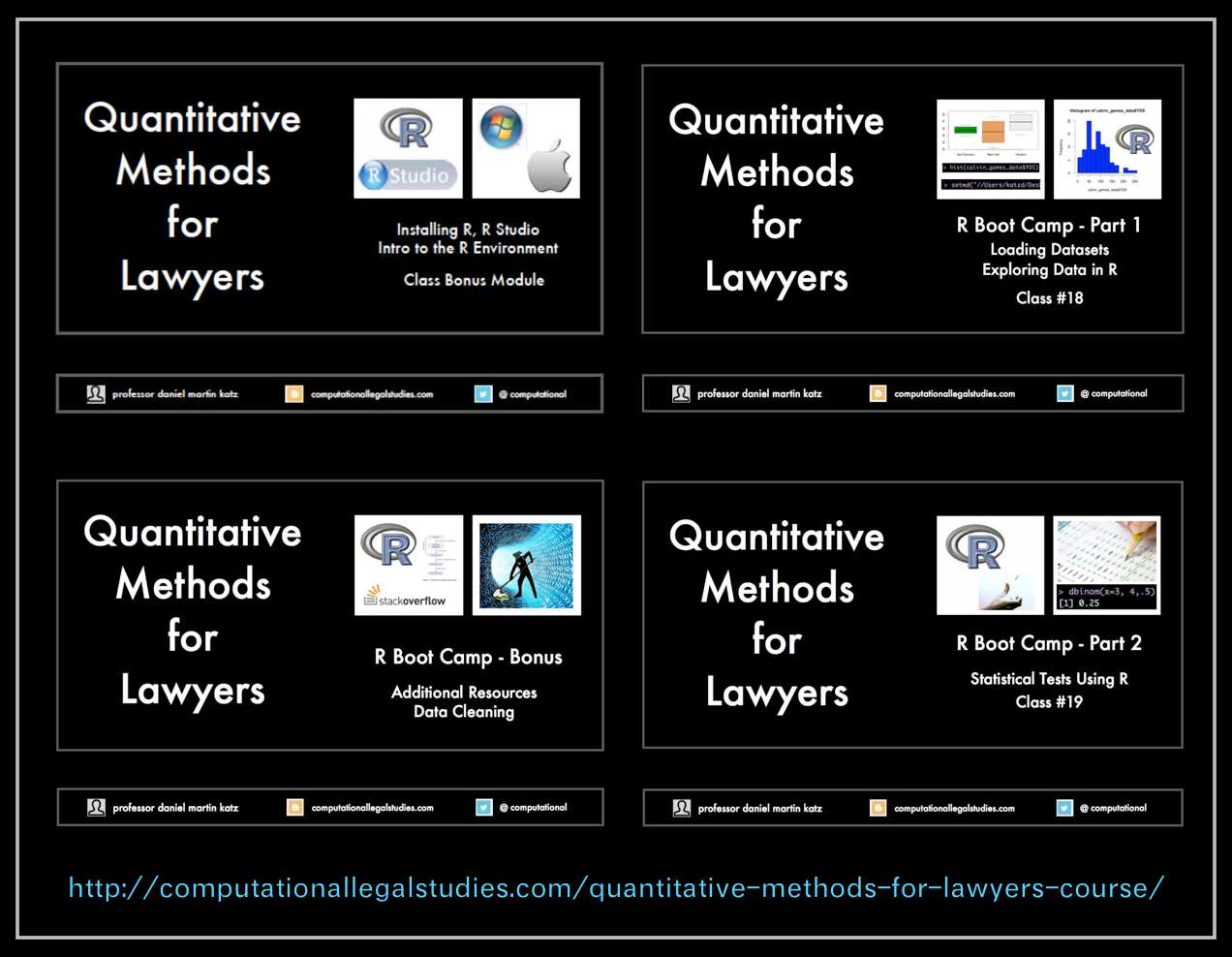 While its performance is sometimes problematic for some extremely large data problems, R (with R studio frontend) is the data science language du jour for many small to medium data problems. Among other things, R is great because it is open source, hyper customizable with thousands of packages available to be loaded for a specific problem.
While its performance is sometimes problematic for some extremely large data problems, R (with R studio frontend) is the data science language du jour for many small to medium data problems. Among other things, R is great because it is open source, hyper customizable with thousands of packages available to be loaded for a specific problem.
While Python and SQL are also important parts of the overall data science toolkit, we use R as our preferred language in both Quantitative Methods for Lawyers (3 credits) as well as in our Legal Analytics course (2 credits). We have found that students who are diligent can make amazing strides in a relatively short amount of time. For example, see this final project by Pat Ellis from last year’s course.
Here are some introductory resources that we have developed to get folks started: Loading R and R Studio
R Boot Camp – Part 1 – Loading Datasets and Basic Data Exploration
Data Cleaning and Additional Resources
R Boot Camp – Part 2 – Statistical Tests Using R
Basic Data Visualization in R
Scatter Plots, Covariance, Correlation Using R
Intro to Regression Analysis Using R
Over the balance of the 2014-2015 academic year, Mike and I will be introducing a variety of new things to the quantitative sequence including dplyR, etc. … more to come …
Why The Best Supreme Court Predictor In The World Is Some Random Guy In Queens (via 538.com)
 Nice coverage of the research in this area and our multi year research agenda attached to forecasting using the three known streams of intelligence (experts, crowds & algorithms).
Nice coverage of the research in this area and our multi year research agenda attached to forecasting using the three known streams of intelligence (experts, crowds & algorithms).
Katz + Bommarito Joining Forces for Joint Research Activities with CodeX – Stanford Center for Legal Informatics
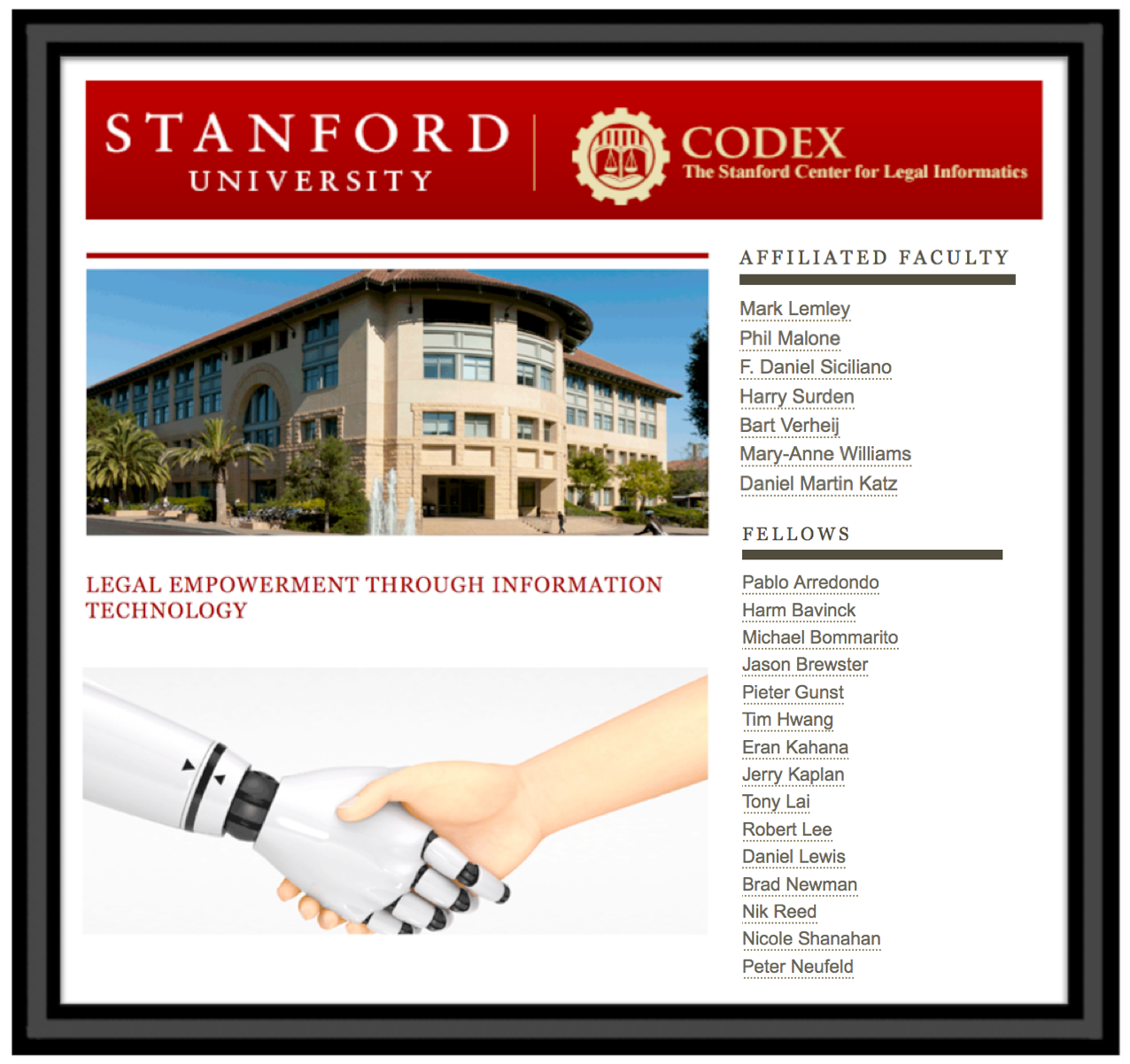 While our primary home will remain here MSU Law, Mike Bommarito and I are excited to be joining up with the good folks at CodeX – Stanford Center for Legal Informatics. Based upon our shared interests, we plan to work together on some joint research activities with some of the many talented individuals in the Stanford CodeX ecosystem. I will be joining CodeX as an External Affiliated Faculty and Mike will be joining as a CodeX Fellow. We are very excited to push forward together in the short, medium and long term!
While our primary home will remain here MSU Law, Mike Bommarito and I are excited to be joining up with the good folks at CodeX – Stanford Center for Legal Informatics. Based upon our shared interests, we plan to work together on some joint research activities with some of the many talented individuals in the Stanford CodeX ecosystem. I will be joining CodeX as an External Affiliated Faculty and Mike will be joining as a CodeX Fellow. We are very excited to push forward together in the short, medium and long term!
Innovation and Emerging Legal Technology (Slides by Ron Dolin from Stanford Center on the Legal Profession)
This past Thursday Ron Dolin and I spole on a panel at the 19th Annual Thomson Reuters Legal Executive Institute Law Firm Leaders Forum. Above are Ron’s slides which many of you might find interesting. Below is a modified version of my presentation Five Observations Regarding Technology and the Legal Industry (which I gave at the LegalWeek Corporate Counsel Forum last month).
Thanks to Ralph Baxter (Chairman Emeritus @ Orrick) for inviting me to present to this extremely accomplished group of AMLaw 200 managing partners.

